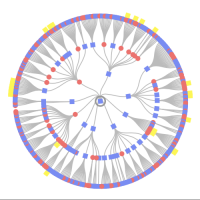What is the official way to enter a wife's name when first name is not known but married name is
Answers
-
Here is a link about adding a spouses name.
Regarding your specific question you would enter the wife's given name and leave the maiden name blank. If you enter the Married name it will hinder the system from finding research hints for her. When entering the names of women proper genealogical naming is to include their maiden name. If you do not know the maiden name leave it blank. Once you find the maiden name you can go back and enter it as the surname.
Hopefully this will answer your question.
Thank you for contacting FamilySearch. It has been a pleasure working with you. Best wishes in finding more information about your family.
0 -
@CHold, I think @BobHarbrecht's post was for a situation where you do not know either the given name nor the maiden name.
0 -
There is no "official way" to do anything, neither in genealogy in general, nor on FamilySearch in particular, except for the considerations forced by software/programming limitations. For example, you cannot leave both the first and last names blank under Vitals: every profile needs at least one name.
In my opinion, if you only know the husband's name, you should only create a profile for the husband. If all you know about a person is a relationship, it can be adequately captured on the other person's profile, and there's almost never any reason to create an empty profile. (The only exception I can think of is when you know that two people were half-siblings, but you don't know anything else about their non-shared parents. The easiest or shortest way to capture that is with "spouse/parent A" and "spouse/parent B" placeholder profiles.)
0 -
Since many records want you to attach an "unknown" mother or wife, I highly recommend using the following method:
If the married name is known enter it is
[Title] Mrs. [First Names] (leave blank) [Last Names] (Married Name)
EXAMPLE:
Mrs. Smith
This works flawlessly, gives a person to attach sources to and allows record hints to be generated.
When the maiden name is found the last name can be changed to that.
1 -
And then comes along someone like me, who simply hates finding such entries, and deletes names entered in that format.
You may call me a vandal, but I like to conform to generally accepted, genealogical practices. I'd sooner enter a "?" than adopt this method. After all, how do you know - in most cases (marriage records without a wife's name being the unusual exception) - whether the couple / parents ever married? I even occasionally still see the rather archaic form "Mrs John Smith" in Family Tree entries.
1 -
"?" is an invalid character and will be flagged as such. This would create a data error in the tree and I do not recommend doing that.
This is question was specifically about the married name of a woman being known.
0 -
I use Mrs and the husband's surname, no given name. Mrs in the title field. So, Mrs Smith not Mrs John Smith. I then work all hints on the children's profiles. More often than not, on a child's record I find her given name and maiden surname.
0 -
Hello.
I assume that Mrs is implied by the connection to the spouse and children, with or without a marriage date or source.
Mrs is not needed. Neither is Miss or Mrs. I never use a ? as it inhibits the algorithms from searching properly.
Here is another link for Help.
Best wishes,
Anitra
0 -
In my comments above I was not advocating the use of "?" for unknown IDs - I have criticised FamilySearch for doing this (in past years) and - as pointed out - it is an "invalid character", too.
If you don't know the name of the person how is any algorithm supposed to work?
It would be rare to know if the couple ever married - if there is no proof, "Mrs Smith" is clearly a wrong way of labelling the unknown mother (perhaps mothers) of "John Smith's" children.
I have only come across one case when I have thought I just might wish to use (in this example) "Mrs Payne" as a name, to create a mother for the children. That was when I encountered an early seventeenth century marriage record for a Richard Payne which did not list any name for his wife. Even when she was buried it was as "the wife of Richard Payne". So at least I knew she had become Mrs Payne - unlike a couple whose marriage is elusive - and the woman's burial (which would at least reveal a first name) cannot be found, either.
In many / most cases I see no other option than to leave the name field blank. No known first / maiden name and no evidence the couple ever married - how can one even put "Mrs Smith"?
If in doubt, just leave it out.
0 -
I assume that Mrs is implied by the connection to the spouse and children, with or without a marriage date or source.
I use the title Mrs to flag for myself when I return to the profile, and for other contributors, that her maiden surname is not known and the surname on the profile title is her husband's surname.
In many lines I work on, a married woman does not take her husband's surname. So if I have no name for her and I fall back on using her husband's surname, then I definitely want to flag that I have done so.
1 -
What evidence do you have that these father's had a wife? This seems highly likely (especially as most illegitimate children were baptised in their mother's name), but apart from the fact that there had to be a woman to produce a child I don't think you have enough evidence to use the term "husband" when referring to an individual (probably a wife) of whom nothing whatsoever is known.
Perhaps your examples are different to mine, but my case is - why create an ID when there are no sources to attach to them?
I understand Church members require some sort of identity for a mother, in order to perform ordinances. To be honest, is this the issue we are stepping around (i.e. not referencing) here? Naturally, as a person not involved in such activities, I will have a different outlook to someone who has a need to name unknown mothers of children who need their "work done".
0 -
I create an ID because there are sources, but in the source index record the mother is "Unknown".
0 -
Can you illustrate with an example? In ten years, I have never encountered any sources for an "Unknown" person (as yet) and would be interested in seeing an example (or two) of how they appear in the source - literally as "Unknown"?
0 -
I see "Don't Know" parents on a lot of death records. The "Don't Know" and "Unknown" etc are in the original record. Here is a record search:
https://www.familysearch.org/search/record/results?q.surname=Don%27t%20Know
Another thing I see a lot with BMD records from Maine, United States is the indexer did not realize the record is a card front and back. So there are index records with the parents name and marriage date but not the names of the newlyweds and image records with the names of the newlyweds but no date and no parents. Eventually they all get attached to the correct pair of profiles but along the way usually there are duplicate profiles to merge.
0 -
"Unknown" shows up frequently in death records and sometimes in marriage records for the parent of a person. They literally show up as "Unknown". I did a search of death records and "unknown" shows up almost 1 million times;
https://www.familysearch.org/search/record/results?count=100&f.recordType=2&q.surname=Unknown
0



